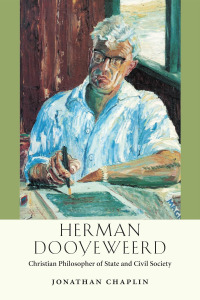Thursday, September 28, 2023

 As part of the student fellowship program at the Center for Apologetics and Cultural Engagement, we work with our student fellows to develop book reviews about significant books that overlap their interests with those of the Center. The following review of Jonathan Chaplin’s Herman Dooyeweerd: Christian Philosopher of State and Civil Society is part of that ongoing initiative.
As part of the student fellowship program at the Center for Apologetics and Cultural Engagement, we work with our student fellows to develop book reviews about significant books that overlap their interests with those of the Center. The following review of Jonathan Chaplin’s Herman Dooyeweerd: Christian Philosopher of State and Civil Society is part of that ongoing initiative.
In today’s charged political climate, many Christians find themselves lost in the divisiveness of government policy and party politics. With nowhere firm to plant our feet, Christians struggle to engage effectively in politics. Herman Dooyeweerd, a contemporary of Abraham Kuyper, developed Kuyper’s system of sphere sovereignty into a rich philosophical and political framework that Christians can use to engage with secular politics. Jonathan Chaplin’s biography outlines Dooyeweerd’s philosophy of state and civil society, a philosophy which enables Christians to remain firm in their beliefs while interacting with contemporary political thought.
Pluralism and the State
The book begins by providing context for Dooyeweerd’s political thought. Specifically, Chaplin unpacks Dooyeweerd’s concept of “normative institutional pluralism,” which he defines as “the presence of multiple kinds of mutually distinct social institutions whose integrity and autonomy it is a primary role of the state to safeguard and support” (25).
Then he lays the Christian foundation for Dooyeweerd’s political philosophy. Dooyeweerd argues that all philosophies possess a transcendental ground idea: a foundational religious presupposition embedded within each philosophy. As a result, Christians can dialogue with secular philosophy, because Christian philosophies are not unique in having religious presuppositions, and these presuppositions carry importance to a well-functioning society.
Modality and the State
Chaplin then continues to unfold Dooyeweerd’s political philosophy. He begins with Dooyeweerd’s understanding of the “modal diversity” of reality. Amidst the complexity of reality there exist structures which are “marked by a plurality of ontologically grounded, irreducible dimensions”: for example, the numeric, the “biotic,” and the economic (79). These aspects of reality are distinct but interconnected; the biotic and historical aspects could intersect when humans take control of and shape culture, for example.
Dooyeweerd identifies fifteen such categories and unpacks their relationship to the structure of society and to social pluralism. Lastly, Dooyeweerd concludes by talking about the identity of the state. Dooyeweerd’s definition of the state is “a differentiated, organized, public-legal community, marked by a juridically qualified structural principle” (294). Ultimately, Dooyeweerd concludes that the state’s primary role is to promote public justice, and he fleshes out the details of that role in a number of helpful ways.
Christian Engagement in Politics
Jonathan Chaplin’s biography of Dooyeweerd provides a framework that kingdom citizens can utilize to stand firm amidst their secular world. In a pluralistic society, Christians and seculars alike may view Christian values as irrelevant to, or imposing on, contemporary political issues. However, in Dooyeweerd’s view of politics and society, every institution is involved in ruling and taking dominion over different modal dimensions of creation. Not only does this give the church a say in society, but it also allows others’ voices to be heard, enabling Christians to engage in politics while respecting the views of others.
Chaplin expounds on Dooyeweerd’s philosophy of politics in a clear and logical manner, helping the reader to see the value of his approach to political engagement. Though contemporary political tensions run rampant and there seems to be little hope for resolution, Dooyeweerd’s philosophy cuts through the tension, offers tools to mend the Christian-secular divide, and provides hope for better political engagement.
Joshua Hicks is a student at Liberty University and is finishing up his undergraduate degree in Biblical Studies with minors in Greek, Biblical Languages, and Theology. He will begin his MDiv in Biblical Languages in the Spring of 2024 at Liberty University. While Joshua Hicks is passionate about all of biblical studies, he is specifically interested in Hebrew, Greek, and Old Testament studies. Outside of academics, he enjoys practicing martial arts, playing board games, and spending time with friends and family.